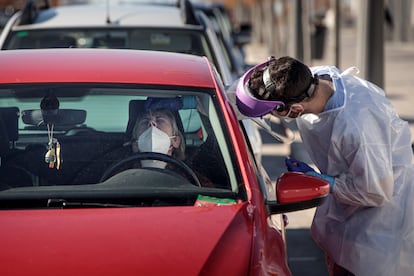New virus, new Covid-19 wave
A study of recent data from South Africa suggests there could be another uptick in infections due to two omicron subvariants, BA.4 and BA.5

Anyone wishing to know what the future of the Covid-19 pandemic looks like would do well to watch South Africa. It’s not because several forms of SARS-CoV-2 first emerged there and later spread across the planet – that, too – but because of the quality of its epidemiological research, conducted by scientists who put raw reality ahead of diplomatic discretion. Thanks to them, we’ve just learned that Covid waves are tied to the emergence of new variants with a greater ability to infect and to escape our immune systems. This strongly indicates that the evolution of the virus is much like an arms race between SARS-CoV-2 and our own antibodies, in what amounts to a classic mechanism of evolution. The crab’s shell becomes thicker to avoid being eaten by a lobster, and the lobster’s claws get bigger so it will keep catching as much food as before. Inside the body of a patient who has survived Covid, antibodies become increasingly efficient while the virus becomes ever more slippery. It’s the laws of nature.
The initial waves of 2020 were caused by the original Wuhan strain and a few others derived from it. The wave of winter 2020-2021 is linked to the beta strain, which was later replaced with the delta variant in the 2021 waves. In late 2021, when things seemed to be quieting down, we had the omicron strain, which came in two flavors or subvariants: BA.1 and BA.2. And now we have BA.4 and BA.5. Each new iteration spreads more than its predecessor and does a better job at eluding human antibodies. As expected, BA.4 and BA.5, the latest designs of viral evolution, are exceptionally good at bypassing our immune system. And they are starting to gain traction in South Africa and parts of Europe. Everything seems to indicate that we will see a new wave, this time caused by SARS-CoV-2 omicron BA.4 and BA.5.
But let’s remain calm: there is no indication that these two subvariants are going to cause a rise in serious Covid cases and hospital admissions. The population’s immunity, either through vaccination or previous infection, can accomplish very little to prevent contagion, but it does protect the infected individuals from developing serious Covid. Some scientists say, half-jokingly, that a single omicron wave could be viewed as a natural vaccination campaign. Of course, people with low defenses – those who are immunocompromised – would do well to protect themselves from infection. It is hard to predict what the virus could do to them, and not even vaccines can guarantee them the same degree of protection as the general population.
Virologists have made a family tree of SARS-CoV-2 and its variants. It shows that neither alfa nor beta nor gamma nor omicron are children of delta, but come from other strains that emerged at the same time as delta. This eliminates the mystical aura around omicron: it did not fall out of the sky six months ago, but simply revealed itself later than other variants. All this knowledge is helping identify which specific mutations are behind the high infection rate and ability to escape immunity. The data has not yet been peer-reviewed.
Tu suscripción se está usando en otro dispositivo
¿Quieres añadir otro usuario a tu suscripción?
Si continúas leyendo en este dispositivo, no se podrá leer en el otro.
FlechaTu suscripción se está usando en otro dispositivo y solo puedes acceder a EL PAÍS desde un dispositivo a la vez.
Si quieres compartir tu cuenta, cambia tu suscripción a la modalidad Premium, así podrás añadir otro usuario. Cada uno accederá con su propia cuenta de email, lo que os permitirá personalizar vuestra experiencia en EL PAÍS.
¿Tienes una suscripción de empresa? Accede aquí para contratar más cuentas.
En el caso de no saber quién está usando tu cuenta, te recomendamos cambiar tu contraseña aquí.
Si decides continuar compartiendo tu cuenta, este mensaje se mostrará en tu dispositivo y en el de la otra persona que está usando tu cuenta de forma indefinida, afectando a tu experiencia de lectura. Puedes consultar aquí los términos y condiciones de la suscripción digital.









































